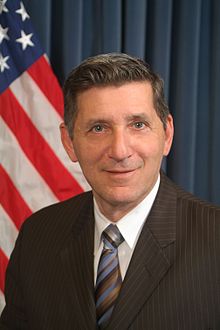Michael Botticelli
Michael Botticelli | |
|---|---|
 | |
| Director of the Office of National Drug Control Policy | |
| In office March 7, 2014 – January 20, 2017 Acting: March 7, 2014 – February 11, 2015 | |
| President | Barack Obama |
| Preceded by | Gil Kerlikowske |
| Succeeded by | James W. Carroll |
| Personal details | |
| Born | January 2, 1958 Troy, New York, U.S. |
| Political party | Democratic |
| Spouse | David Wells |
| Education | Siena College (BS) St. Lawrence University (MEd) |
Michael P. Botticelli (born January 2, 1958) is an American public health official who served as the director of the White House Office of National Drug Control Policy (ONDCP) from March 2014 until the end of President Obama's term. He was named acting director after the resignation of Gil Kerlikowske, and received confirmation from the United States Senate in February 2015. Prior to joining ONDCP, he worked in the Massachusetts Department of Public Health. Following completion of his service as ONDCP Director, he became the executive director of the Grayken Center for Addiction Medicine at the Boston Medical Center.
Early life and education
Botticelli was born in
Botticelli began drinking alcohol regularly in his junior year of high school. By his 20s, he was an
Career
After achieving sobriety, Botticelli joined the Massachusetts Department of Public Health, in 1994. He worked as a coordinator for alcoholism programs from 1994 through 1995, as contract manager for HIV-related policies and services from 1995 through 1996, as an assistant director for policy and planning from 1996 through 2000, as the chief of staff to the public health commissioner from 2000 through 2003, and as director of substance abuse services from 2003 to 2012.[5] In the latter role, he oversaw the pilot program for Quincy, Massachusetts, police to begin carrying naloxone to treat opioid overdose, and the expansion of substance abuse treatment services in community health centers.[2][5]
Following the end of the Obama administration, the Grayken Center for Addiction Medicine at the Boston Medical Center named Botticelli its executive director.[9][10]
Botticelli is a member of the National Association of State Alcohol and Drug Abuse Directors. He has been an advisory committee member of the
Honors and awards
*ASAM Public Policy Award (2015) Archived July 8, 2016, at the Wayback Machine
- Ramstad/Kennedy National Award for Outstanding Leadership in Promoting Addiction Recovery (2008)[11]
- National Association of State Alcohol and Drug Abuse Directors Service Award (2012)[11]
Personal life
Botticelli and his husband, David Wells, were married in 2009.[12]
References
- ^ a b c Schwarz, Alan (April 25, 2015). "Michael Botticelli Is a Drug Czar Who Knows Addiction Firsthand". The New York Times. Retrieved April 27, 2015.
- ^ a b c d e "US drug czar has roots in Boston, alcoholism - Metro". The Boston Globe. June 22, 2014. Retrieved June 24, 2014.
- ^ a b "Acting 'Drug Czar' Walks the Talk". NationalJournal.com. Retrieved June 24, 2014.
- National Archives.
- ^ a b Join Together Staff (February 1, 2012). "Obama Announces Intent to Nominate New Deputy Director for ONDCP | The Partnership at". Drugfree.org. Retrieved June 24, 2014.
- ^ Everett, Burgess (February 9, 2015). "Senate confirms new drug czar". Politico. Retrieved February 9, 2015.
- ^ Pelley, Scott (December 13, 2015). "A New Direction On Drugs". www.cbsnews.com. Retrieved December 15, 2015.
- ^ Scott Pelley (December 13, 2015). "A New Direction On Drugs". CBS News. Retrieved May 3, 2017.
- ^ /00:00Playing Live (March 22, 2017). "Former White House Drug Czar To Lead Addiction Medicine Center In Boston | CommonHealth". Wbur.org. Retrieved May 3, 2017.
{{cite web}}: CS1 maint: numeric names: authors list (link) - ^ "Boston Medical Center picks ex-Obama drug czar to run opioid center". The Boston Globe. March 22, 2017. Retrieved May 3, 2017.
- ^ National Archives.
- ^ "New face of recovery: White House drug czar". WUSA9. Gannett. April 30, 2014. Archived from the original on March 31, 2015.
External links
- "Michael Botticelli - Acting Director of National Drug Control Policy". National Archives.
- "Botticelli deputy director of drug policy". United Press International. Retrieved November 28, 2012.
- Appearances on C-SPAN

